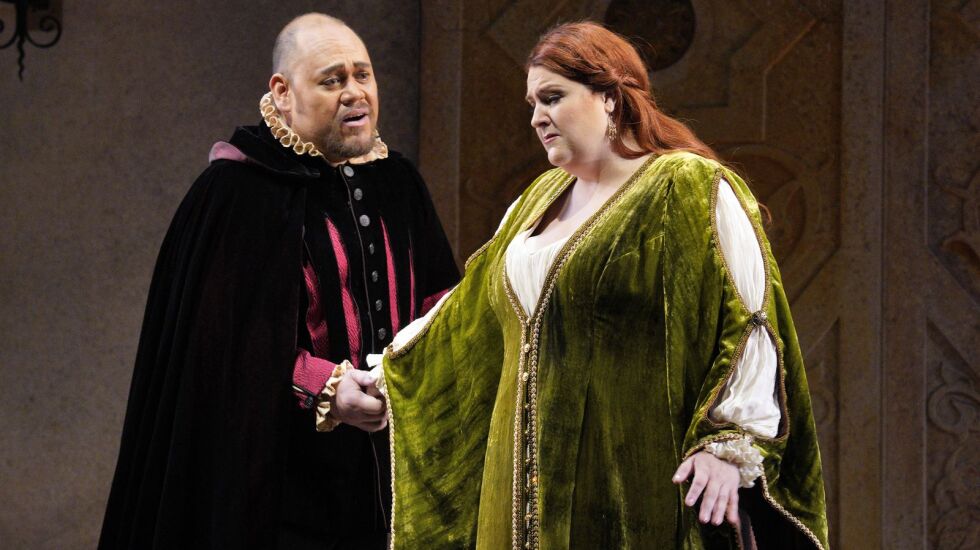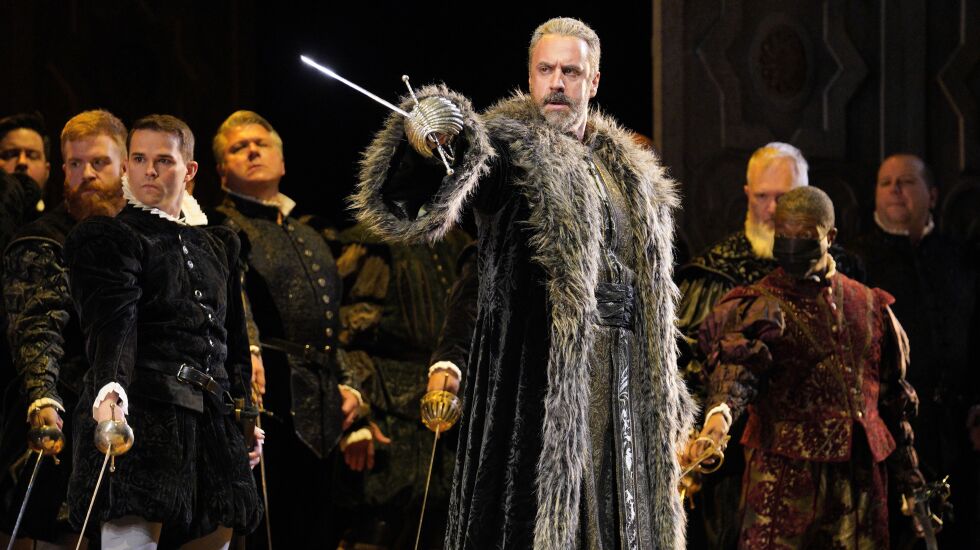
After the September 2019 announcement of Enrique Mazzola as Lyric Opera of Chicago’s new music director, the Italian conductor jumped right into one of his first major initiatives, a plan to lead five of Giuseppe Verdi’s early operas — one a season.
Although not exactly a groundbreaking idea, the Early Verdi Series, as it is simply titled, gives Chicago audiences a chance to hear some of the less frequently performed operas by one of the field’s greatest creators, and it shows off a part of the repertory for which Mazzola is highly regarded.
The series began with “Luisa Miller” when Mazzola was still music director designate and it reprises with the fourth installment, “Ernani.” The 1844 opera opened the company’s 2022-23 season Friday evening at the Lyric Opera House and continues with four more performances through Oct. 1.
Although set in 16th-century Spain, a violent time in which soldiers are lurking at every turn, the opera is a surprisingly compact, interior work. It revolves around a kind of romantic quadrangle, with three men in pursuit of the same woman, Elvira (soprano Tamara Wilson), and sometimes life-and-death questions of love, duty and honor.
Despite some compelling arias and ensemble singing and Mazzola’s fine work in the pit, this production never seemed to completely jell. There was a kind of stiffness, even awkwardness to the interactions that was especially apparent in Act 1, which did not spark until the entrance of Silva (bass-baritone Christian Van Horn), who injected a much-needed jolt of energy.
This rigidity could, of course, have been the result of just the unsettledness or tentativeness of opening night. And it could partly be attributed to the opera itself, which for all its musical strengths and fascinating character interactions simply does not have the dramatic potency of some of Verdi’s later, better-known operas.
But at the same time, at least part of the blame must be placed at the feet of stage director Louisa Muller, who arguably needed to do more to sharpen the identities of the four principal characters and animate the dynamics among them.
The production brought back sets and costumes that were originally used for the company’s 2009-10 presentation of “Ernani.” They were designed by Scott Marr, who has worked at Lyric since 1990. He retired following Friday’s performance from his current post — wardrobe, wigs and makeup artist director.
Unlike the projections and other high-tech wizardry seen in some recent Lyric productions, the scenery here featured traditional painted drops (including the addition of a striking, newly realized 65-by-56-foot mountain scene for Act 1) with hanging chandeliers and other visual elements that work effectively enough and pair well with Marr’s opulent and no doubt well-researched period costumes.
As Lyric makes clear in materials accompanying this opera, all four of the main singers are American and have appeared in previous Verdi productions with the company. For the most part, they adroitly handled the ample vocal demands of this opera.
Arguably, the two standouts were the lower-voiced principals, starting with baritone Quinn Kelsey, who has appeared in 18 roles at Lyric since 2003-04 and took the role of Carlo, king of Spain. Although he seemed to have trouble warming up in Act 1, he delivered one of the finest arias of the evening in the Act 3, a poignant and at times almost forlorn look back at his life as he vows to change if crowned Holy Roman Emperor.

Also strong was Van Horn as Silva, Elvira’s aging guardian who tries to force her to marry him. As previously noted, the bass-baritone, who also has 18 Lyric roles to his credit, brought abundant verve and punch to his singing, nicely pairing vocal power with a smooth, velvety timbre.
Although not as impressive as Ernani, Elvira’s true love, as he was in last spring’s Lyric production of “Tosca,” tenor Russell Thomas possesses a good feel for Verdi’s style and delivered a solid take on this role. Rounding out the principals was Wilson, who, like Kelsey, was slow to get on track in Act 1. But she ultimately found her footing, delivering some vocal fireworks and more than holding her own with her three male counterparts.
While it was possible to question other aspects of the production, Mazzola’s facility for Verdi was richly in evidence all evening long. He crisply shaped the pacing and drew the best from Lyric’s first-rate orchestra and chorus, especially during the reflective Act 3 with its dark, beautiful and often transparent textures.







